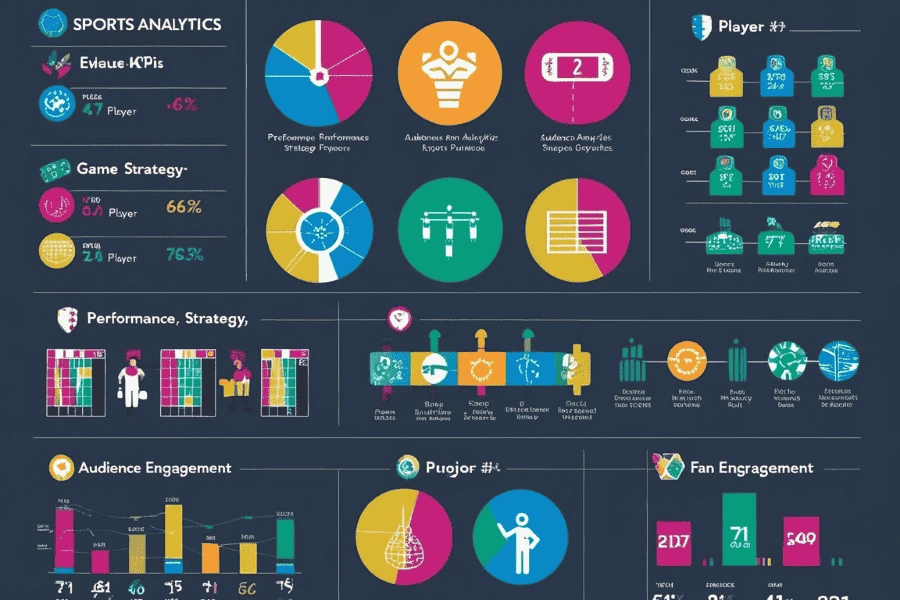Sports Analytics: Performance, Strategy, and Fan Engagemen
Introduction
In the evolving landscape of modern athletics, sports analytics has emerged as a critical tool in shaping competitive success. With data guiding everything from player performance analysis to fan engagement strategies, teams and organizations are making more informed, strategic decisions than ever before. This article explores how data-driven insights are revolutionizing sports through advanced technologies and smarter approaches to performance, planning, and connection with fans.

Maximizing Performance Through Data
Athletic performance today is no longer measured only by scores and stats. Using athlete performance metrics, coaches and analysts gain a detailed understanding of an individual’s physical condition, workload, and efficiency on the field. Tools such as wearable technology in sports track real-time data like speed, acceleration, heart rate, and fatigue levels enabling personalized training and quicker injury recovery.
These insights are often visualized through advanced sports data visualization systems, helping coaching staff identify performance trends and biomechanical imbalances. By applying this data, teams can design precise conditioning programs that not only improve output but also reduce the risk of overtraining and injuries.
Strategic Decisions Backed by Numbers
Winning isn't just about talent, it's about applying the right strategy at the right time. Teams now rely heavily on predictive analytics in sports to forecast outcomes, fine-tune game plans, and adapt in real-time. Real-time sports analytics provides immediate feedback during matches, allowing coaches to make adjustments on the fly.
Metrics like expected goals (xG), win probabilities, and player heat maps are all generated using advanced sports analytics platforms. These tools offer tactical insights that were previously unavailable, giving teams a measurable advantage both before and during games.
Smarter Scouting and Recruitment
The search for new talent has shifted from instinct to insight. By leveraging sports analytics tools, recruiters can assess a prospect’s long-term potential based on historical performance, health data, and growth trends. Rather than focusing solely on highlight reels, scouts now consider detailed player performance analysis and athlete performance metrics.
Using predictive analytics in sports, clubs can identify undervalued players with strong upside and avoid high-risk signings. These models help teams make smarter investments, minimizing the chance of injuries and maximizing the return on contracts and development efforts.
Elevating Fan Engagement with Data
Modern fans crave more than just the final score; they want to be immersed in the experience. Teams use fan engagement strategies driven by data to deliver tailored content, exclusive offers, and interactive features. Behavioral analytics gathered from mobile apps and social media allows franchises to personalize experiences across digital platforms.
Live games now include sports data visualization overlays, providing fans with in-depth stats, comparisons, and player insights. Technologies like real-time sports analytics enable second-screen experiences that boost engagement and increase fan loyalty, whether in the stadium or watching from home.
Smarter Coaching and Training Methods
Coaching has entered the era of hyper-personalization. With access to comprehensive sports analytics platforms, training is designed based on an athlete’s current form, physical feedback, and past performance. By combining physical, tactical, and cognitive data, coaches can adjust routines in real time.
Wearable technology in sports also enables predictive alerts when players are approaching physical thresholds, supporting injury prevention. Coaches are now able to monitor minute-by-minute progress using sports analytics tools, delivering data-driven development plans that are both safe and effective.
Business Intelligence in Sports Management
The business side of sports is also benefiting from data-driven decisions. Franchises use sports analytics platforms to manage ticket pricing, optimize merchandise sales, and track fan engagement across touchpoints. Dynamic ticket pricing adjusts based on demand, opponent strength, and audience behavior helping maximize revenue.
Broadcast networks and media teams utilize sports data visualization to create compelling, interactive content for different viewer segments. Personalized marketing, powered by sports analytics tools, increases ROI and deepens fan loyalty.
Grassroots and Youth Analytics Adoption
Even at the amateur and youth levels, data is starting to play a big role. Affordable sports analytics tools now allow coaches to track athlete performance metrics, design custom drills, and prevent injuries. Parents and young athletes gain a better understanding of progress through clear, data-driven feedback.
The Future of Sports Analytics
Looking forward, technologies like artificial intelligence and machine learning will play an even greater role in refining sports analytics. These systems can process vast datasets faster than ever, offering predictive insights with increasing accuracy. Innovations like neuro-tracking and AI-powered motion capture will add new layers to athlete performance metrics and decision-making processes.
However, with greater data collection comes the need for clear ethical boundaries. Protecting athlete privacy and ensuring transparent use of personal information will be crucial as these systems become more widespread.
Conclusion
Sports analytics is no longer an optional upgrade, it's a competitive necessity. From real-time sports analytics that enhance tactical decisions to fan engagement strategies that build loyalty, data is reshaping how sports organizations operate. With the help of sports analytics platforms, wearable technology in sports, and predictive analytics in sports, teams and players are better equipped than ever to perform, connect, and win.
Active Events
Maximizing Your Earnings: 7 Strategies for Business Analysts in 2024
Date: Aug 07, 2025 | 7:00 PM (IST)
7:00 PM (IST) - 8:10 PM (IST)
2753 people have registered
Data Scientist Challenges One Should Avoid
Date: August 14, 2024 | 7:00 PM (IST)
7:00 PM (IST) - 8:10 PM (IST)
2753 people have registered
Bootcamps
Data Analyst Bootcamp
- Duration:8 weeks
- Start Date:October 5, 2024
Digital Marketing Bootcamp
- Duration:8 weeks
- Start Date:October 5, 2024
